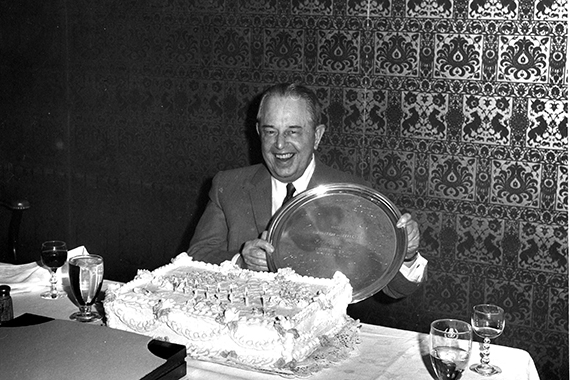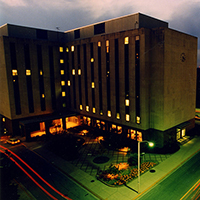 Krannert alumni, faculty, staff and students celebrated Herman C. Krannert in November in honor of the 5Oth anniversary of the building that bears his name and the endowment that he and his wife, Ellnora, provided for its construction and the School of Management's continued growth. Above, Herman Krannert celebrates his 80th birthday at Purdue in November 1969. (Archive photo)
Krannert alumni, faculty, staff and students celebrated Herman C. Krannert in November in honor of the 5Oth anniversary of the building that bears his name and the endowment that he and his wife, Ellnora, provided for its construction and the School of Management's continued growth. Above, Herman Krannert celebrates his 80th birthday at Purdue in November 1969. (Archive photo)
A Toast to Herman Krannert
Namesake building celebrates 50th anniversary
In November 2014, Krannert alumni across the globe — from West Lafayette, Chicago, Houston and New York to Shanghai and Switzerland — raised their glasses in a collective toast to Herman C. Krannert, whose $2.73 million endowment helped lead to the construction of the first dedicated building for Purdue’s School of Management.
Krannert and his wife, Ellnora, were generous contributors not only to Purdue, but also to many educational, cultural and civic projects. Today, 11 buildings bear the Krannert name, most of them at hospitals and universities in Illinois and Indiana.
Krannert, who was born in Chicago on Nov. 5, 1887, seemed from the beginning to be interested in finance, business and technical studies. Characteristically, he worked his way through college, graduating from the University of Illinois in 1912 with a bachelor’s degree in mechanical engineering.
Shortly after graduation, Krannert began a lifelong career in the paper industry at the Sefton Paper Co. and soon became its youngest general manager. In 1925 he entered business for himself, founding the Inland Container Corp., which became the nation’s second-largest manufacturer of corrugated shipping cartons.
Krannert was by temperament a man of action rather than a theoretician or academician. His management ideas had been tested in one of life’s best-devised laboratories, the industrial world itself. He recounted many of these lessons in his annual Founder’s Day lectures, which were published in book form in Krannert on Management.
He once summed up his personal philosophy of business by saying: “Everyone is wrong some of the time if he does anything. The man who tries never to be wrong will over-study every situation and over-studying can be a serious waste of time. There are two parts to every decision — the thinking part and the willingness to act in the face of uncertainty.”
He restated this in a Founder’s Day lecture when he told students: “Your education will have to be continued on your own, largely by the process of stumbling and picking yourself up and trying again.”
He advised students to look for job opportunities in companies shifting to new concepts of leadership and which, consequently, have “real gaps in their management structures.” An oft-repeated bit of advice to students was not to settle for a career as an expert. He believed that the boss — the generalist — made the big decisions, while experts wrangled in interminable argument.
In one of his last appearances at Purdue before his death in 1972, Krannert said: “At the end of your career you will be able to say, ‘I have run the company; I have created an organization; I have managed a city — and the city is better than it would have been had people like myself walked away from the job and left it to the experts.’ Putting a whole project together and seeing it go is an indescribable thrill of accomplishment.”
In this special feature package, we celebrate both the man and the building that bears his name, including a first-person account of its construction by the late John Day and a photo gallery illustrating the school’s growth over the last half-century. Readers can also share their memories via Twitter and Facebook and test their institutional knowledge for a chance to win Krannert apparel.
Cheers!





